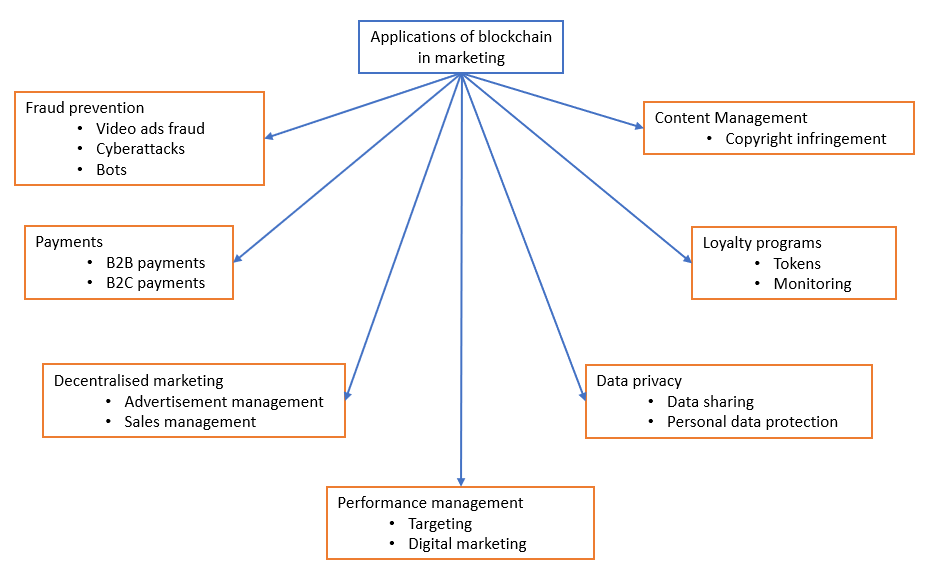Leveraging Blockchain Technology In Marketing
What is Blockchain and what are its benefits?
Blockchain, in simple words, is a database of transactions across several nodes, or in other words, a decentralized distributed digital ledger. So, what does that mean? It means that each verified transaction is stored in a unit called Block and each block contains the transaction data along with its timestamp as well as the cryptographic data of its preceding block. A block is created for every transaction that happens in the Blockchain and the ledger for the transactions is distributed along all the nodes, due to which it is also known as Distributed Ledger technology. The purpose of Blockchain is to enable the recording and distribution of digital data without the ability to modify it. In this sense, a Blockchain serves as the foundation for immutable ledgers or transaction records that cannot be changed, erased, or destroyed.

[Title: Characteristics of Blockchain]
These major characteristics of Blockchain make it suitable to be utilized in a variety of industries. All of these make it secure and help remove intermediaries, which thereby improves trust in the system and reduces the transaction cost. All these characteristics bring forth a particularly important aspect of Blockchain called Smart Contract, which is a software program based on logical expressions and is only executed once the terms of the contract are fulfilled. This process is automated and does not require any intermediaries, and hence has multiple use cases in different industries.
How does Blockchain solve real-world challenges?
With Blockchain and all its above-mentioned characteristics, we can address a range of real-world challenges in different industries. Let us dive deeply into how this revolutionary technology can be utilized in some of these industries:
- Healthcare: Manually filling out health forms takes time and frequently results in information duplicity. Moreover, this also leads to privacy breaches due to insecure systems and manual document management. Blockchain enables healthcare management by making it easier to retrieve previous healthcare records, save time and prevent record duplication, apart from being securely encrypted.
- Real estate: Data in real estate changes hands due to the involvement of multiple intermediaries and is centralized. This poses the risk of manipulation at various levels. Blockchain, due to its decentralized and transparent nature, secures the authenticity of the property data and receives it directly from the public rather than depending on a central entity.
- Election system: Manual voting takes time, money and is prone to errors. A Blockchain-led voting system saves time and resources. Votes are processed in no time and encrypted, allowing the government to make the results public as soon as possible.
- IT sector: Organizations that follow conventional as well as traditional methods of making data available to all stakeholders need a lot of infrastructural support and spending. Blockchain, on the other hand, works as a decentralized database, which distributes and makes data available across different nodes, and does not require large infrastructure investments.
- Supply chain: It is challenging for businesses to keep track of product mobility within their industry. It is tough to monitor a product’s path from beginning to conclusion due to record keeping by multiple entities. Blockchain creates a global system that serves as a public source of truth for tracking a product’s journey throughout its life cycle.
- Accounting: Maintaining financial records requires consistency. Moreover, conventional payment settlement takes time and is quite expensive. Blockchain, with a triple-entry accounting system, provides transparency and brings down the settlement period to a day with a transaction cost of a cent or less, with the transaction happening in seconds.
Utilizing Blockchain in marketing:
Marketers spend billions every year due to the lack of transparency, to prevent fraud, and improve brand safety and privacy. According to an article by the World Federation of Advertisers, 71% of marketers in 16 of the biggest global markets agree that evaluating the effectiveness of digital media investment has become increasingly difficult over the years. Video ad spends, having constituted 45% of ad spends, was targeted by 64% of all ad frauds. Organizations lost around $10 billion to cyberattacks and bots. Blockchain is a disruptive technology in the marketing industry, which can not only make it easier for marketers to evaluate digital media spends, but also prevents frauds and cyberattacks. It has a wide array of applications (as can be seen in the diagram but not limited to) in marketing from content management, data privacy, and loyalty programs to payments, fraud prevention and many more.

Applications of Blockchain in Marketing
Here, we have delved into a few of the applications of blockchain mentioned above:
- Fraud Prevention: the immutability and transparency aspects of blockchain help marketers keep track of fraudulent activities in their advertising campaigns by identifying the bots that are placed to artificially boost views and clicks. This allows them to take preventive measures for such activities and hence, increase security and reduce the marketing spend.
- Payments: digital payments are the most obvious usage of blockchain. Smart contracts and cryptocurrencies are the aspects of blockchain that make digital payments between advertisers, publishers as well as customers easy, transparent, and streamlined. These not only make the transactions happen instantly but also eliminate the dependency on intermediaries, thereby reducing the cost and increasing trust.
- Decentralized Marketing: the domains of sales and advertising management are making progress with Blockchain. Advertisers can now automate the entire process by eliminating the dependence on third-party data, and have more transparency over the advertisement and sales campaigns with real-time monitoring by verifying customer engagement and ad delivery, in a cost-effective way.
- Performance management: blockchain improves the process of targeting customers for digital marketing campaigns and not only makes it easy for marketers to measure the performance of their different marketing campaigns (like digital marketing & email marketing), but also helps avoid fraud, thus saving money in the process.
- Content Marketing: the ownership of content (images, videos, etc.) has become quite a hassle in the digital world. With blockchain-enabled content platforms, marketers can easily track their content and have enhanced control over quality and protection from copyright infringement. Blockchain provides a feature of documenting ledgers digitally, which helps marketers and content creators own the rights and have control over their content.
- Loyalty Programs: blockchain provides the ability to revolutionize conventional loyalty schemes. Integrating the entire loyalty scheme with tokens can not only help bring it on a single platform and make it easier for marketers to engage and interact with their customers, but also enable visibility over transaction history among an organization and its customers, thereby improving business efficiency. This increases the transparency of loyalty programs and makes them easy to monitor, thus increasing the overall customer experience.
- Data Privacy: in the current digital advertising industry, data privacy is a big concern among consumers. Consumers are afraid of data leaks, which prevent them from sharing data. Blockchain, with its anonymity and immutable characteristics, can easily help build trust. Consumers can share their data in the blockchain, and this can be shared/sold to organizations without the need of any intermediary. Organizations, on the other hand, will not have to depend on a third party for data.
Should blockchain be introduced in the marketing ecosystem?
Blockchain has the capability to disrupt the marketing industry. Its application will help remove intermediaries, improve trust amongst consumers and increase transparency with the ability to audit and provide accountability, which will further help organizations reshape the relationship with their customers and consumers. Although many organizations, including CPG (Consumer Packaged Goods) entities and finance giants, have already started exploring blockchain-based platforms, it is important to remember that blockchain is a very new solution to address conventional marketing problems. It can provide an opportunity to identify the loopholes and challenges faced by marketers, thus helping them progress.
Before implementing blockchain, organizations should carry out due analysis about the risks and challenges involved like blockchain protocols, data privacy legislation, etc. After deciding on implementing blockchain, selecting the right vendor is important. Since blockchain is a modern technology, about a decade old, it has become essential to find vendors with sustainable businesses and technical longevity. Essentially, instead of implementing blockchain for the entire operation of the marketing/organization, finding a project with high innovation requirements and exposing it slowly to blockchain-based platforms will give it an opportunity to understand how much of its marketing operations need to be blockchain-enabled.
References
- What Is Blockchain in Marketing? Strategies, Best Practices, Benefits of Blockchain | Toolbox Marketing
- ICCMI_2019_Blockchain applications in Marketing (researchgate.net)
- Harvey=Blockchain Changes Marketing-2019.pdf (nthu.edu.tw)
- Can blockchain solve some of marketing’s biggest problems? – World Federation of Advertisers (wfanet.org)
Latest Blogs
he supply chain is a network of suppliers, factories, logistics, warehouses, distributers and…
Introduction What if training powerful AI models didn’t have to be slow, expensive, or data-hungry?…
Pharmaceutical marketing has evolved significantly with digital platforms, but strict regulations…
Leveraging the right cloud technology with appropriate strategies can lead to significant cost…





